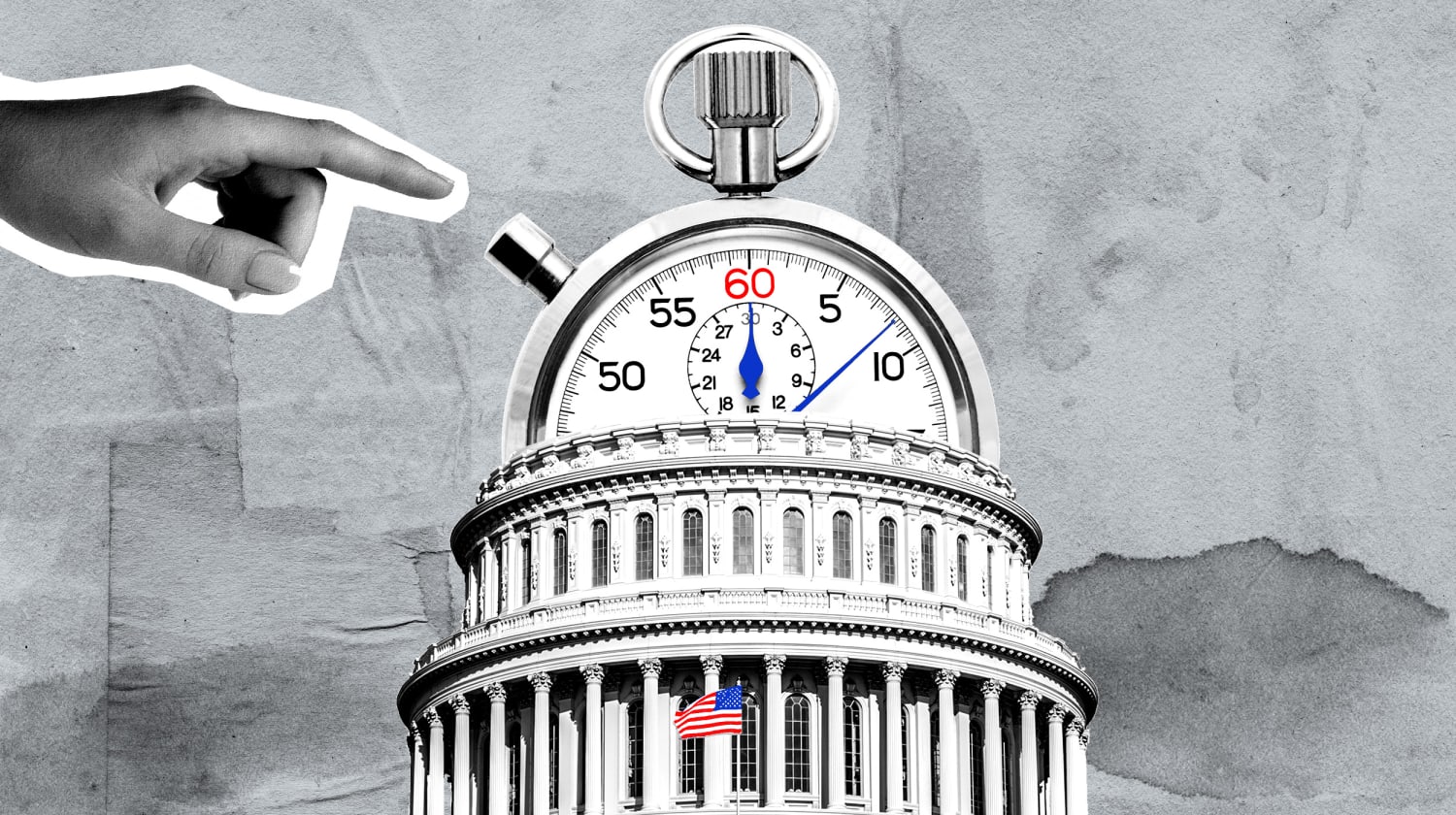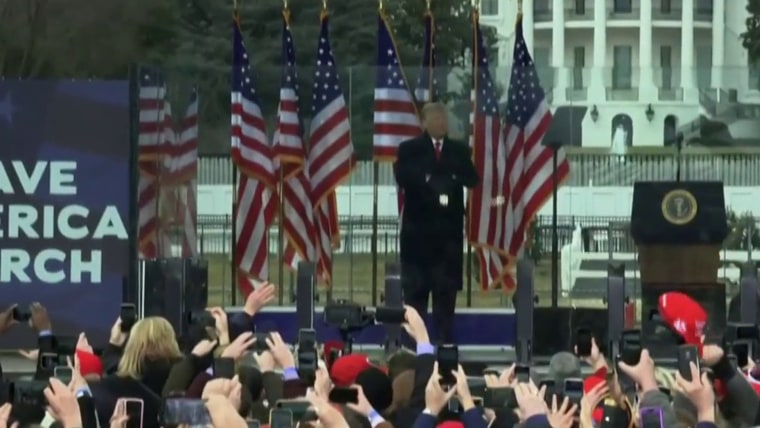WASHINGTON — One year after the deadly attack on the U.S. Capitol, Congress is eying new laws to prevent future attempts to subvert democracy, with the goal of passing legislation this year.
The House committee investigating the riot is considering “enhanced penalties” for presidential dereliction of duty, as Vice Chair Liz Cheney, R-Wyo., says it has evidence that former President Donald Trump sat idly by and watched the violence unfold on television.
Rep. Adam Schiff, D-Calif., a member of the committee, said lawmakers are examining clarifications and changes to the 1887 Electoral Count Act, which governs the counting of electoral votes for president in Congress, a tradition that sparked the violence as Trump supporters seized on the day to try to prevent President Joe Biden’s win from being finalized.
“We found out, surprisingly, how poorly written it is, how ambiguous many of its provisions are, how simply things could be triggered without merit. And so we’re looking at how to reform that in a way that would have support across the spectrum, in terms of constitutional scholars,” Schiff said, saying the status quo is “a point of great vulnerability in terms of our democracy.”
“The challenges in 2020 were superficial and patently absurd,” he said. “In the future, though, if it came down to a single state and the state attempted to overturn the popular will and Congress’ role came down to interpretation of an ambiguous provision in the Electoral Count Act, it could be a real crisis.”
Among the changes under consideration: raising the threshold to challenge electors to more than just one House member and one senator; overhauling unclear “safe harbor” rules that give states a deadline after which, some argue, Congress can disregard their electoral votes; and making it clear that the vice president doesn’t have unbridled power to discount electors.
Entering the new year, the committee faces a crucial stretch as it wrestles with how to handle reluctant witnesses and whether to subpoena members of Congress. The panel is bracing for its first public hearings in the coming weeks and months while facing pressure to wrap up and turn its legislative proposals into law by the midterm elections.
An aide said the committee “will consider a wide range of legislative recommendations as we continue our investigation and craft our report.”
“Our aim is to ensure nothing like January 6th ever happens again, and that includes attempts to overturn the outcome of the 2020 election and stop the counting of electoral votes,” the aide said.
‘Still a democracy’
The cause has taken on new urgency after the Jan. 6 committee obtained evidence that Trump allies were seizing on gaps in the 1887 law to plot a strategy to overturn Biden’s victory. The failed plan hinged on then-Vice President Mike Pence’s acting unilaterally to throw out electoral votes for Biden.
“We absolutely have to clarify it. The act that’s in place now is open to too much interpretation. I don’t think it was ever the intention that you could create a scenario where the vice president basically can decide whether or not we’re still a democracy,” said Rep. Colin Allred, D-Texas. “And that’s basically what we came down to in this last certification.
“One of the biggest things that has to be clarified is the vice president’s role, which is not to make declarative decisions about whether or not to accept or reject results,” Allred said.
Congress should also make it clear that its job is “not to fact-find or to investigate,” he said.
The proposals point to a core purpose of the committee’s investigation: to provide legislative recommendations to Congress about how to prevent another attack and to secure democracy from what lawmakers and historians see as an existential threat.
One challenge facing any new bill is that it would be subject to a Republican filibuster in the Senate, where Minority Leader Mitch McConnell, R-Ky., on Tuesday mocked fears of states’ overriding the will of voters.
“Why would any legislature in America want to overturn the counting of votes? They have to get elected by those people, too,” McConnell told reporters. “The notion that some state legislature would be crazy enough to say to their own voters ‘We’re not going to honor the results of the election’ is ridiculous on its face.”
More than 140 congressional Republicans voted to block the counting of some of Biden’s electoral votes. Since he left office, Trump has sought to purge governors and state officials who resisted his lie that the result was illegitimate. Critics say he is laying the foundation to steal the 2024 election.
Even so, Sen. Shelley Moore Capito, R-W.Va., said: “I don’t think we need to legislate that. We have those provisions pretty clear in our Constitution.”
Sen. Roy Blunt, R-Mo., said the Electoral Count Act should simply be repealed and not replaced.
‘It’s really frightening’
Still, some advocates say there’s a potentially fatal flaw in relying on Congress: a twisted interpretation of the Constitution that has risen from far-right circles.
“The biggest threat to the democracy is, chillingly, a false constitutional theory called the independent legislature doctrine, which suggests that state legislatures can wave a magic wand at any point and nullify their states’ voters to send presidential electors to whoever they favor,” said Daniel Squadron of the States Project, a Democratic group aiming to win state elections.
Squadron said the only ironclad way to prevent that is to deny Trump-allied Republicans control of state legislatures, a project that Democrats are failing at.
“Every state legislature in a swing state in America has a Trumpist majority today. So if that doesn’t change in 2022, those Trumpist majorities will hold the democracy in their hands, whatever happens with federal and state law,” he said. “The 2022 election is going to have as much impact on who takes the presidency as the 2024 election.”
Rep. Jamaal Bowman, D-N.Y., said that Jan. 6 was merely a “test run” and that Congress needs to act to “prevent a future coup attempt by any means necessary.”
“We’ve had the socialism-capitalism fight. We’ve had the progressive-versus-moderate fight. We’ve had the Democrat-Republican fight. But this is a fight for democracy against fascism. The enemy is fascism,” he said.
Lawmakers are struggling to find the right approach. Giving Congress too much power to challenge electors could enable a majority party to disregard legitimate results. But negating a role for Congress could eliminate its power to stop states from overriding the will of voters.
“We have real concerns with a false slate of electors’ being sent. And what are the thresholds for challenging that? Anything you do to the threshold for challenging a slate of electors could impact both protecting a real slate that comes or challenging a false slate,” Allred said. “So that’s very difficult to balance.”
Allred said future attempts to subvert elections will be “more coordinated, more organized.”
“We have to be honest that everything we’re seeing right now is laying the groundwork for some kind of challenge to the results in 2024,” he said. “It’s really frightening.”
Source: | This article originally belongs to Nbcnews.com











